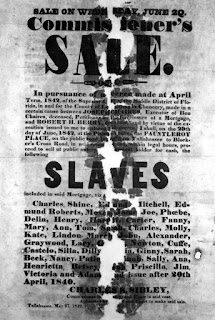Slave Auctions: A Thing of The Past?
A man
addressing an unseen crowd.
Big strong
boys for farm work
$400…
$700.. $700.. $800
The numbers
roll in.
These men are sold for $1200 Libyan pounds ($400 a piece.)
These men are sold for $1200 Libyan pounds ($400 a piece.)
CNN report
A few days
ago, CNN reporter, Nima Elbagir, did an expose on a modern day slave auction. I am not talking about the slave auctions of
the past which I write about in my most recent book, The Weeping Time: Memory and the Largest Slave Auction in AmericanHistory. I am talking about slave auctions taking place today in Libya according to her report.
The
political and social chaos in Libya coupled with the migrant crisis has no doubt
given rise to this phenomenon. The UN
reports that there are more people on the move than at any time since World War
II. Much of this movement is towards
Europe which is perceived as a beacon of opportunity for people in war torn or
impoverished countries in parts of Africa and the Middle East. Migrants swindled by smugglers rarely reach their destination and end up instead in
detention centers where they are offered up for sale.
This can not
be happening, you say. This is the 21st
century but the truth is that slavery is still a reality in some places in the world
and even here in North America. No country or culture is immune. I am
thankful that there are organizations which are keeping this in the spotlight
but often speculate as to WHY this institution has raised its ugly head again.
I often
think that it is because we never had a full reckoning of either the historical legacy of
the Transatlantic Slave trade or the TransSaharan Slave trade that this institution still has currency.
It is not
too late to decry these practices of the past and the present. The African Union, in particular, needs to
play a more central and proactive role. This is what it was set up to do.
For the rest
of us, it is not too late to raise our voices and request that those who
represent us –truly represent our values and our stance against all forms of
human bondage then and now.
See below CNN’s coverage of these modern day auctions, have your say and consider taking action.
http://www.cnn.com/2017/11/17/africa/libya-slave-auction-investigation/index.html
Additional Sources:
Kevin Bales, Disposable People: New Slavery in the Global Economy and Ending Slavery.
Additional Sources:
Kevin Bales, Disposable People: New Slavery in the Global Economy and Ending Slavery.
Anne C. Bailey
On the Road with The Weeping Time….
Publishers’ Weekly Notable African
American Titles of 2017-18
The Weeping Time: Memory and the Largest Slave Auction in American History (Oct., $24.32) by Anne C. Bailey. In this landmark and
moving academic work Bailey closely examines the March 1859 auction of more
than 400 slaves from the Butler Plantation estates—considered the largest slave
auction in US history—analyzing the lives of the slave families before, during
after the auction.
The African American Intellectual History Society (AAIHS) Black Perspectives
http://www.aaihs.org/the-weeping-time-a-new-book-on-the-largest-slave-auction/
Title: Advertisement
of slave sale: Leon County, Florida Date: 1842
URL: http://www.floridamemory.com/items/show/34910 Public Domain
Slave Auctions: A Thing of The Past?
 Reviewed by Unknown
on
November 26, 2017
Rating:
Reviewed by Unknown
on
November 26, 2017
Rating:
 Reviewed by Unknown
on
November 26, 2017
Rating:
Reviewed by Unknown
on
November 26, 2017
Rating:










No comments